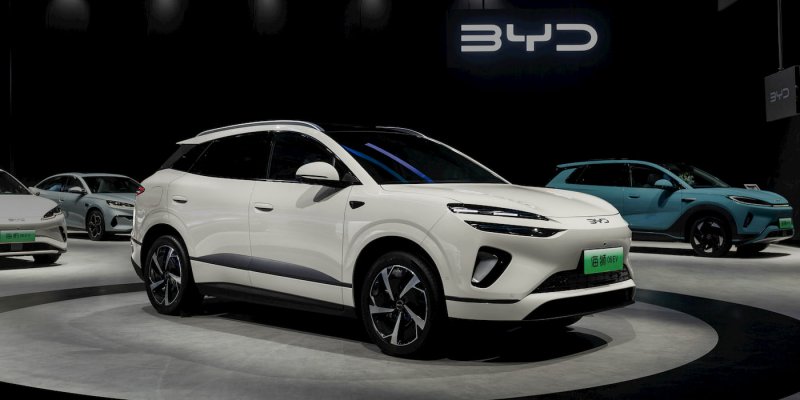Why Africa relies on nuclear energy rather than solar energy
Burkina Faso, one of the least electrified countries, is partnering with Russia's Rosatom to build a nuclear power plant, aiming to increase its electricity supply. Critics argue that solar energy should be prioritized in Africa due to ample sunlight. Other African countries, such as Uganda and Kenya, are also considering nuclear power, but skepticism exists regarding the necessity, given their renewable energy potential. Concerns about safety and investor motivations for entering the African nuclear energy market have been raised, despite the potential for job creation and economic growth.

Burkina Faso is one of the least electrified countries in the world. According to data from the International Atomic Energy Agency (IAEA), only about 20% of the population has access to electricity. Yet electricity is urgently needed and central to economic development.
The military government, which came to power in a military coup in 2022, recently signed a declaration of intent aimed at increasing the country's electricity supply. As part of the agreement, Rosatom, a state-owned Russian company, will be responsible for constructing a nuclear power plant. This development could significantly enhance Burkina Faso's electricity capacity within the next few years, but experts are skeptical about the viability of the project.
Ibrahim Traore has ruled the country since the 2022 military coup and, at age 35, is the youngest serving president in the world. He has largely turned his back on France, the former colonial power, as a partner and, instead, has set his sights on Vladimir Putin's Russia.
Solar power as a viable option
For critics like Adrien Poussou, the former Central African Republic minister for national reconciliation, the construction of a nuclear power plant is merely a form of Russian propaganda.
"It is absurd that the African continent, which has sun, can have problems with energy and electricity," the political analyst told DW.
Solar energy should be the solution, not an agreement to build a nuclear power plant, he stressed.
Burkina Faso is not the only African country dabbling in nuclear energy in collaboration with foreign partners. Rosatom also aims to assist Mali in harnessing civilian nuclear power. In addition, Rosatom has been constructing Egypt's inaugural nuclear power plant in the city of El Dabaa on the Mediterranean coast. The project, initiated in 2022, is set to comprise four Russian power plant blocks, each generating 1,200 MW of power. Other parts of Africa are also considering nuclear power as a viable, low-carbon option for generating electricity alongside renewable energy sources. Uganda's Ministry of Energy announced in March of this year that nuclear energy would be utilized to generate more electricity in the country by 2031. Preparations are reportedly underway to evaluate a site in eastern Uganda's Buyende District for the construction of the first nuclear power plant. In that vein, Uganda has signed an agreement with China's National Nuclear Corporation (CNNC) to jointly construct two reactor blocks located 120 kilometers (75 miles) northeast of Kampala. Neighboring Kenya has expressed its intention to begin building a nuclear power plant in the year 2027, with an estimated construction timeline of 10 years. The districts of Kilifi and Kwale, which are located near the port metropolis of Mombasa, are currently being considered as potential locations. The Kenyan nuclear authority, NuPEA, has stated that the power plant, once finished, will be able to meet the country's increasing energy demands by generating approximately 1,000 megawatts of power.
After all, Kenya is widely recognized as a trailblazer in Africa for its utilization of renewable energy sources such as solar, wind, and geothermal power, which collectively contribute to the generation of green electricity. The country currently derives around 90% of its energy from renewable sources, primarily geothermal energy, hydroelectric and wind power. The Kenyan government has established a target of fulfilling its entire energy requirements through renewable sources by the year 2030. On a side note, Germany and Kenya reached an agreement on a climate and development partnership during the World Climate Conference (COP27) in Sharm el Sheikh, which took place in November 2022. Regarding the atomic energy issue, Iraki suspects that investors are primarily motivated by the potential financial gains associated with introducing nuclear power plants to Africa. However, "they are being shut down in other places in the world because nuclear power is not very popular in many industrialized countries," he noted. Iraki also issued a warning about the potential risks associated with reactor accidents, such as the incidents at Chernobyl in 1986 and Fukushima in 2011. The examples mentioned thus far involve reactor types that already exist dozens of times in other countries. Rwanda is adopting a unique approach: Dual Fluid Energy Inc., a Canadian-German company, is set to construct a test reactor featuring a novel technology. According to the Rwandan Atomic Energy Authority, the start-up has successfully created a groundbreaking liquid fuel and coolant using lead. This development has reportedly led to a reduction in radioactive waste. Experts like Iraki feel that the boom in nuclear energy in Africa is not to the continent's advantage. According to him, the growing interest among investors is fueled by the need to exploit a market. Critics of nuclear energy point to countries such as Ghana, Nigeria, Sudan, Zambia, and Zimbabwe, which have signed letters of intent with partners to explore potential uses of nuclear energy in the coming decade, but where many such projects in the past have dematerialized. South Africa serves as an example. Currently, it is the only country in Africa that has successfully established and operated a nuclear power plant. The sole operational reactor on the continent is located in Koeberg, near Cape Town, operationalized in 1984.
Princess Mthombeni, a South African activist and co-founder of Africa4Nuclear, is looking to the future and takes a twist on the developments. She told DW that "nuclear" is an opportunity for the continent. "I see this as a great move because African nations finally need to prioritize industrialization in order to grow their economies and create much-needed jobs for their people." "It is time for us as an African continent not to reinvent the wheel, but rather to use the energy technologies that have proven themselves in developed countries," she told DW. The young activist believes that focusing on industrialization in African countries is a crucial step toward boosting their economies and creating much-needed jobs. For her, it would be great if African countries adopted "baseload technologies such as nuclear energy, as well as the socioeconomically sensible and responsible mix of renewable energy sources such as wind and solar energy."
Kenya's nuclear plans
A mixed bag
New approach?
 03:32
03:32Opportunity for investors, not Africa?
South Africa has been contemplating the expansion of nuclear energy for years. At present, a significant portion of its electricity is generated from coal, which has a negative impact on the climate.
Additionally, the state electricity supplier, Eskom, is facing significant challenges in adequately meeting the electricity demands of both industries and the general population.
What is Your Reaction?
 Like
0
Like
0
 Dislike
0
Dislike
0
 Love
0
Love
0
 Funny
0
Funny
0
 Angry
0
Angry
0
 Sad
0
Sad
0
 Wow
0
Wow
0















































































